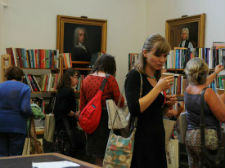Events
Report: Women’s History Conference
On 24, Sep 2014 | In Events | By Nicola Gauld
The Women’s History Network’s annual conference, Home Fronts: Gender, War & Conflict took place at the University of Worcester from September 5-7 2014.
Although the focus lay on Home Fronts of the 20th century, there were a number papers relating to earlier history that demonstrated the universality of certain themes. One such was a thread concerning the forms of relief and support for wives and families surviving during their husbands’ time away at the front. Susan Mary Grant led, in the first keynote, with her examination of the ‘Dislocations of the Home Front for Southern women during the American Civil War’, when the Front was literally camped in some of these women’s front yards.
The next day, John Black’s paper on the influence of the ‘Women Volunteers in the Army Pay Office at Woolwich during 1914’ in distributing separation allowance and outdoor relief, demonstrated that behind every faceless administrative system, there are people who work to ensure that it is as humane as possible. This thread was picked up in Paul Huddie’s investigation into ‘Victims or Survivors: army wives in Ireland during the Crimean War’. Curious as to why so many Irish wives were not claiming the relief payments to which they were entitled from the Royal Patriotic Fund, Huddie uncovered evidence that some feared to apply lest their Catholic children were whisked away to be converted by the Anglican administration (not the case, protested the Bishop in the press), or were indeed making their own way by taking work in service or as shirt-makers in the army towns.
I could go on – there were so many elements to take in. I was thrilled to chair Deborah Thom’s outstanding keynote on how the Imperial War Museum has presented the ‘Public History of Women and War’ since its establishment in 1917; whilst conversations over coffee cups about Commonwealth War Graves Commission, the protocols of grief in time of war, the visual rhetoric of the women’s recruiting poster and the hierarchies of women’s work will keep me thinking for a long while yet.
Jenni Waugh
Independent heritage and community history consultant



